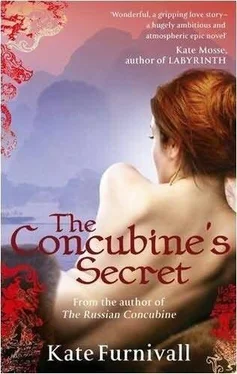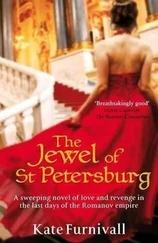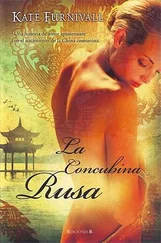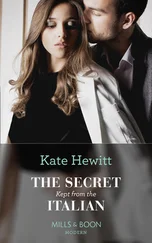A sad-eyed peasant stared down at Lydia from the wall of the restaurant with dark, accusing eyes. The strange, almost strangled face made her nervous. A waiter with a courteous smile and garlic breath pulled out her chair and shook a napkin out on to her lap, making her jump. Chairman Malofeyev noticed it and gave her a moment to settle while he busied himself with the wine menu.
Lydia had expected a hotel dining room, one of the big impressive but impersonal places like the Hotel Metropol, where she’d watched the elite Soviet officials strutting through its doors with chests puffed out like the pigeons that used to whirr overhead in Junchow. But no. She got that wrong.
Instead he took her somewhere that showed exquisite taste, somewhere small and intimate. Immaculate stark white table linen, not stiff or starchy, underlined the sense of elegance without formality. Lydia had never seen anywhere quite like it before and wasn’t sure what to make of it. It was modern. Strange and disturbing paintings lined the walls, vivid and demanding; swirls and spikes of colour that made no sense or bold stylised portrayals of peasants and factory workers. The chairs were oddly proportioned, long-backed, the wood painted an unforgiving black with seats bright scarlet, and the carpet was almost too dizzying to step on. Geometric shapes in red, black and white zigzagged across its surface, so that it seemed to Lydia as though she was seated in the middle of a bonfire.
She felt ignorant. Acutely aware that this was a different world she had entered, one where her footing was unsure. The opportunities for making a fool of herself were immense.
‘Do you like them?’ her host asked, indicating the artworks on the wall.
‘They’re different,’ she responded guardedly.
He looked at her with amusement, leaning forward, elbows on the table. ‘But do you like them?’
She stared around her thoughtfully. ‘I like that one.’ She pointed to one of the baffling explosions of colour that she was sure represented something but she couldn’t quite work out what. It possessed an energy that appealed to her.
He nodded approvingly. ‘It’s a copy of a Kandinsky. One of my favourites.’
‘But I don’t like that one over in the corner.’
‘The Malevich. Why not?’
‘It’s depressing. A plain black canvas, all life sucked out of it. What’s it about? It…’ The longer she gazed at the painting the more it made her want to cry. ‘It hurts. I could do better myself.’
‘Do you paint?’
‘No.’
‘Do you write?’
‘No.’
She could feel the ground growing slippery under her feet.
He leaned back in his chair and studied her. ‘You have an artistic look about you. I like that.’
Chyort! He was making assumptions. She knew absolutely nothing about art. She’d read a bit but that didn’t make her a writer. But her mother had been a pianist, so maybe…
‘I play the piano,’ she lied modestly.
He was smiling, pleased with himself rather than with her. ‘I knew I was right. You are a bohemian at heart.’
She watched his eyes skim over her thoughtfully. What? she wanted to shout. What are you seeing?
‘So,’ he said smoothly, ‘let’s start with names. I am Dmitri Malofeyev. I live in Moscow and sit on committees and commissions, hence the Chairman title. I like horse riding and occasional gambling. What about you?’
‘Lydia Ivanova.’
He inclined his head in a chivalrous little bow that revealed a bone-white line parting the dense waves of his red hair. The skin of his face and hands was winter-pale and lightly freckled. ‘My pleasure, Comrade Ivanova.’
‘I am from Vladivostok.’
‘Ah, an interesting place.’
She sat dry-mouthed. Vladivostok was thousands of miles from Moscow, as far as you could possibly go without falling into the China Sea. Please, please, let him know absolutely nothing about it.
‘That explains,’ he said lightly, ‘your interest in the Chinese Communist Party, just over the border from Russia. Except I’d heard they are active in the south of the country rather than the north.’
‘They’re… expanding all the time.’
‘Ah, good. I’m glad to hear it. So tell me, young comrade, what you are doing here in Moscow?’
‘I…’
A waiter, tall and thin in a black shirt and narrow trousers that made his legs look like sticks, hovered at Malofeyev’s shoulder with the bottle of wine he’d ordered. The moment’s delay gave Lydia time to snatch at an answer. As the dark red liquid spilled into her glass while around her the muted meeting of cutlery and bone china hummed softly, politely, throughout the restaurant, she took a wary pace forward. Balanced precariously on the first stepping stone across a fast-flowing river.
‘I’ve heard things,’ she said. ‘About Moscow. I wanted to see them for myself.’
She saw interest flare in the grey eyes. She lowered her gaze to the napkin on her lap as though reluctant to say more. Unseen, she wiped her moist palms on the white material.
‘What kind of things ?’ His tone was serious, the laughter gone.
‘How Stalin is transforming the hearts and minds of Muscovites. Building wonderful new communal housing where everything is shared, even the clothing and the children.’ She raised her eyes and let regret sneak into her words. ‘In Vladivostok the people are not so ready for change. Despite the new factories and jobs that Communism is providing, they cling to their old bourgeois ways.’
‘Is that so?’
‘Yes.’ She noticed that her hands were fidgeting with the cutlery. She stilled them. ‘I want to be a part of the activist movement. I want to be in the forefront with the Constructivists and the Kinoks who are bringing a whole new kind of cinema and music and design to the people.’
Thank you, dear Alexei, for pushing so many books into my hands so I could learn about the new modern Russia. We must be prepared, you said.
‘You see, I was right when I said you were artistic.’ He raised one sandy eyebrow. ‘But you are remarkably well informed for someone from the backwoods of Vladivostok.’
‘I read a lot.’
‘Obviously. So tell me, what is it you want to see?’
‘I want to see Eisenstein’s films – like October. It’s wonderful that he uses non-professional actors, real people. It’s all genuinely about the young proletariat, about their rising up against the Capitalist order.’ She could hear her voice growing excited.
He nodded. ‘I admit the cinema is a vital weapon in educating people. To train their minds to grasp socialist concepts.’ He paused, pulled at his long earlobe. ‘What else?’
For a moment her mind cast about blankly and all she could focus on was that this man was her one path to Chang An Lo. Don’t slip.
‘What else?’ he asked again.
She thought carefully. ‘I want to see Tatlin’s designs and go to the Kolomy Zal Doma Soyuzov to listen to Shostakovich’s music. Did you know he even included the sound of factory whistles in his Second Symphony?’ Her mother had hated that. Vulgar , she’d called it.
‘No, I didn’t know that.’
‘And,’ she lowered her voice until it was almost secretive, ‘there’s talk of an underground railway system to be built beneath Moscow itself.’
He didn’t speak. Just stared at her solemnly across the table. Had she overdone it? Was she about to plunge into the churning river’s depths?
‘Work,’ he said at last. ‘You don’t mention work at all.’
‘Ah, of course I want to work.’
‘What kind of work?’
What kind? Which should I choose? A teacher? A librarian? Even a mythical pianist?
Читать дальше












